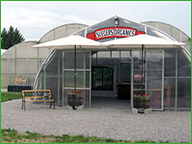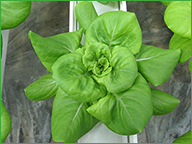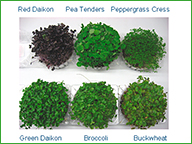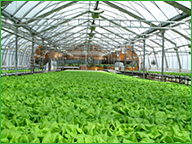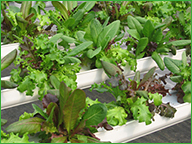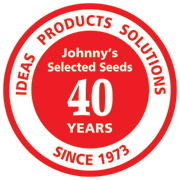- Johnny's Farm Visits & Grower Profiles
- Johnny's 2021 Grower Profiles
- Johnny's 2020 Grower Profiles
- Johnny's Tools Advisor Eliot Coleman: Celebrating Over 20 Years of Partnership | Johnny's Selected Seeds
- Late-Summer Recipe Preview with Farmer-Chef Frank Giglio | Three Lily Farm, Thorndike, Maine
- Johnny's Selected Seeds Visits Martha Stewart's Farm in the Hudson River Valley
- Javier Zamora of Javier Sanchez Medina (JSM) Organics Farms | Royal Oaks, California | Johnny's Farm Visits & Grower Profiles
- Farm Visit: 4-Town Farm, Seekonk, Massachusetts | Johnny's Selected Seeds 40th Anniversary
- Grower Profile: Selwood Green, Walton & Halifax, Nova Scotia, Canada | Johnny's Selected Seeds 40th Anniversary
- Grower Profile: Peach Crest Farm & Cooper Organics, Stratford, Oklahoma | Johnny's Selected Seeds 40th Anniversary
- Farm Visit: Paradise Farms Organics - Homestead, Florida | Johnny's Selected Seeds 40th Anniversary
- Grower Profile: Growing Power Urban Farm - Milwaukee & Madison, WI & Chicago, IL | Johnny's Selected Seeds 40th Anniversary
- Grower Profile: Slegers Greenhouses - Strathroy, Ontario, Canada | Johnny's Selected Seeds 40th Anniversary
- Grower Profile: Gathering Together Farm - Philomath, Oregon | Johnny's Selected Seeds 40th Anniversary
- Grower Profile: Pleasant Valley Farm - Argyle, New York | Johnny's Selected Seeds 40th Anniversary
- Farm Visit: Mark's Melon Patch – Dawson, Georgia | Johnny's Selected Seeds 40th Anniversary
- Grower Profile: Louie's Pumpkin Patch - Skövde, Sweden | Johnny's Selected Seeds 40th Anniversary
- Grower Profile: Living Water Farms - Strawn, Illinois | Johnny's Selected Seeds 40th Anniversary
- Farm Visit: Circle Fresh Farms - Denver, Colorado | Johnny's Selected Seeds 40th Anniversary
- Grower Profile: Freedom Farm - Freedom, Maine | Johnny's Selected Seeds 40th Anniversary
Slegers Greenhouses • Strathroy, Ontario, Canada
40th Anniversary Farm Visit — July 2013
Jo and Pauline Sleger of Slegers Greenhouses have built a successful business around three strategies: their greens are available year-round; they are certified organic; and everything they sell is a living product with roots attached.
Defining their business by those three characteristics makes it sound like a simple recipe for success. But in fact, their greenhouse operation in Strathroy, Ontario, Canada, is a complex system developed over more than 25 years.
The Slegers grow greens of all sorts — full-size lettuces, baby greens, and microgreens — 24 products in all. They sell to the food-service industry, retail stores, and a home box program. Nearly all their products are sold into the Toronto metro area, a two-hour drive away. They also have a small, honor-pay stand at the farm, which is halfway between Toronto and Detroit.
Their production system is a hybrid of hydroponics and soil culture, something they have been refining over the years.
"We're using a lot more soil than most hydroponic greenhouses because we sell everything with roots attached," Jo explains. "Our greens are subirrigated, using an ebb and flow system."
The Slegers have 30,000 square feet of heated, lighted greenhouses filled with long, linear, raised water troughs. They have been certified organic since 2004. The organic hydroponic system "is the single most difficult thing we do," Jo Sleger states. "It's more than twice as difficult as conventional hydroponics."
That's primarily because organic nutrients require much more maintenance of the irrigation system. "Our plumbing is always a nightmare," says Jo.
Going Organic
Slegers Greenhouses is located on the farm where Jo grew up. His parents were tobacco producers and, after he graduated from college, invited him and his brother to run their own agricultural businesses on the farm. Together they started growing ginseng, and Jo decided to put up a hydroponic greenhouse.
At first, he signed on with a marketing cooperative that was looking for growers to supply lettuce. For eight years, Slegers grew a single crop, Boston lettuce. But they felt the business was not moving forward and keeping up with trends, so they struck out on their own.
Through the late 1990s, they grew mache and salad greens and shipped them to restaurants in New York City. "When 9/11 happened, it took a lot of the market away," Jo says. "Our customers were literally at Ground Zero."
In the wake of the terrorist attacks, the hospitality industry shrank while import regulations and currency exchange became less favorable. Slegers Greenhouses adjusted again, selling their products in Canada only.
Meanwhile, Jo was increasingly uncomfortable with the high pesticide requirements of the ginseng crop. "We had to make 22 passes of some (pesticide) applications, and I was the spray guy," he says. "I have a wife and three children, and we decided we were going to take a simpler approach."
So he quit the ginseng business and turned his attention to getting his greenhouse certified organic. He also transitioned 100 acres of surrounding cropland to organic, and they now grow cash crops including corn, soy, wheat, and fresh peas.
Production to Packaging Live
All of Slegers' products are sold with the root ball attached to provide a better shelf life for the consumer. They custom pack orders to the customer's preference — either in bags or in "clamshells" of recyclable PET plastic.
Living lettuce is sold in large bunches, 12 clamshells per box, as individual varieties. Among the most popular products are arugula, basil, Boston lettuce, cilantro, green and red leaf lettuce, kale, mizuna, tatsoi, and watercress. Baby salad greens are also available as mixes of lettuces, mustards, and other greens.
Although it's common to sell lettuce in clamshells with the roots attached, the Slegers have expanded the concept to microgreens. They actually grow their microgreens in the small, round clamshells in which they will be sold. The rigid boxes have about 1.5 inches of growing media. The seeds are sown in the boxes, and grown for a few weeks to the desired size. Each variety is grown separately, but up to six varieties can be packed into a carton to provide variety for small food-service facilities. For larger establishments, full trays of single varieties are available.
Microgreens are gaining popularity, Jo says, so they offer a wide selection of the small seedlings: broccoli, buckwheat, green and red daikon, garnet amaranth, pink kale, pea tenders (shoots), mizuna, peppergrass, sunflower, sorrel, and wheatgrass. They offer corn shoots in garden flats, and several mixes of salad green seedlings.
Growing microgreens in the boxes in which they will be sold completely eliminates the time-consuming task of harvest.
Year-round Service
"One of our cornerstones is that our products are available all year," Jo says. "The service element is critical — you need to be there or you're quickly forgotten."
Another benefit of year-round operation is that Slegers Greenhouses can keep its 15 employees working, which reduces staff turnover.
But with 24 different products, each with different days to maturity, and a large number of custom orders, Jo devotes a lot of time to scheduling.
"We sell twice a week, so every week I start all over with my seeding schedule based on the previous week's sales," he explains.
Getting Started in Hydroponics
Asked what he would advise people interested in getting into an organic hydroponic business, Jo says "There's no formula. I advise starting small; the stakes need to stay low."
He also says that new growers should not start on the production end but, rather, on the market end.
"It's all about the uniqueness of your social environment," he said. "Work with your customers first to find out what they need, and then work backwards. The greenhouse is the last thing to think about."
- To learn more, visit the Slegers Greens website.
- Images reproduced with permission from Slegers Greenhouses. All rights reserved.
- Browse all Johnny's 40th Anniversary Farm Visits & Grower Profiles.


